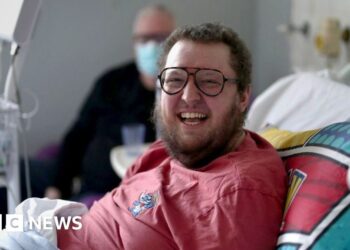
“What does it really mean to upload your consciousness into intangible space?”
Francesco Carta/Getty
In Every Version of You, the characters face an impossible choice: upload your mind into a virtual utopia, or crumble away in the abandoned physical world.
Mind-uploading is familiar to us as a science fiction trope, often anchoring relationship dramas and philosophical inquiry. But what does it really mean to upload your consciousness into intangible space? Can the mechanics be extrapolated from our present-day science? And if you could do it, would you?
At the heart of my novel, beneath the tender romance and the shiny technology, is a theoretical and philosophical problem: the Ship of Theseus paradox. The version recorded by Plutarch in the 1st century asks whether a ship that has been entirely replaced, piece by piece, remains the same ship. In the centuries to come, philosophers riffed on the original thought experiment. What if you gathered up all the original pieces of the ship – planks, oars, masts, sails – and built a second ship? Which ship, if either, is the true Ship of Theseus? The paradox forces us to draw a distinction between the material essence of a thing (wooden planks, neural circuits, molecules…) and our concept of its wholeness, its trueness.
In Every Version of You, my character Navin, who decides to upload himself to Gaia, a virtual utopia, is our ship. Navin is a fork in the road. At the point of uploading, his physical and uploaded self are theoretically identical. But from that point onwards, the two potential Navins diverge and walk different paths. Virtual Navin is not what “Meatspace” Navin would have been, had he survived.
I had to reverse-engineer the science of uploading to make it sound somewhat plausible. Some stories gloss over the mechanics so they can foreground other important elements: the relational, the philosophical, the satirical. The subject might place a device on their head or run an infusion through their veins and find themselves magically lifted out of their bodies into “the cloud”. Other stories address the science rigorously and viscerally. The depiction of a brain being consumed by laser scanning, slice by slice, in the television series Pantheon, leaves no ambiguity about the destruction of the embodied self.
Exercising my writerly privileges, I bounced off neuroscientific foundations to hypothesise wildly in the realm of science fiction. At the time I was developing the novel, I was working in several neuropsychiatry units and studying for my psychiatry exams. (The recent edition of the New Scientist’s How to Think About series, exploring theories of consciousness, certainly would have come in handy during my research!)
After reading about neural networks and connectomes, I began to imagine consciousness as an incredibly complex network of activity, with the patterns of activation varying from individual to individual. If those connections and their activation patterns could be replicated by a sufficiently advanced computer, then perhaps a copy of the mind could be created without any attachment to a physical body. The flip side of the coin, of course, is whether we will ever have sufficiently advanced computers to hold a human mind without information loss or degradation.
When I gave early manuscripts of Every Version of You to friends, what struck me was the spectrum of reactions to uploading. Some were horrified. “You mean they killed off the originals?!” Others naturally took a more detached and philosophical leaning: if there is continuity of substance and subjectivity, what’s to say the uploaded person isn’t the same person?
Would I upload to Gaia? My answer isn’t straightforward. In our intellectualistic society, we sometimes forget that we aren’t merely detached minds controlling fleshy appendages. We forget that the mind and the body are woven together in a complex tapestry – and more often than not, the body leads the dance. The gut, heart, skin, glands and vessels are in constant conversation with the brain.
Beyond that, we are shaped by our external environment, by our attachments to others, by our relationship to nature. The psychoanalyst Esther Bick wrote about how our “psychic skin”, the container for our sense of internal self, arises from sensory experiences in early infancy. Sever our minds from our bodies, and something will be lost.
In Every Version of You, uploading forces us to reckon with the insidious ways that technology consumes us. We let technology into our lives – into the intimate spaces of our homes, our bodies – because it’s convenient, shiny, fun, exciting. But who owns what we give over to technology? Who would own our uploaded minds? I hope that I would hold out against uploading for a long time, to find a different way of living on Earth. But I can’t say for sure what I would do in the end. If all my loved ones were in Gaia, it would be difficult to resist the lure.
Grace Chan is the author of Every Version of You (Verve Books), the November 2025 read for the New Scientist Book Club. Sign up to read along with us here.
Topics:
Source link : https://www.newscientist.com/article/2502181-if-you-could-upload-your-mind-to-a-virtual-utopia-would-you/?utm_campaign=RSS%7CNSNS&utm_source=NSNS&utm_medium=RSS&utm_content=home
Author :
Publish date : 2025-10-31 09:30:00
Copyright for syndicated content belongs to the linked Source.











